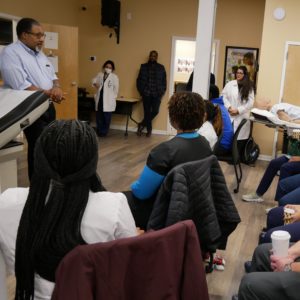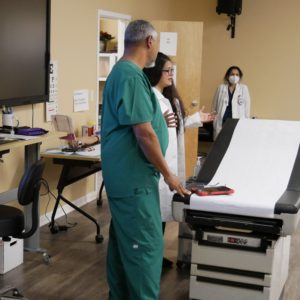MCAT, is it right for you?
You’ve studied Chemistry and Biology, spent long hours immersed in Anatomy, and have even shadowed doctors and volunteered in hospitals; all to become a well-rounded Medical Student Candidate. But, after you’ve saved thousands of dollars to take an MCAT Prep Course and hundreds more for the MCAT test itself, can a test determine your fate as a future medical student?
What kind of cat is the MCAT?
The Medical College Admissions Test, or MCAT is a national standardized test designed to gauge a medical school applicants’ knowledge of basic science concepts, as well as their skills in problem-solving, critical thinking, and writing.It seems as though the MCAT was designated as the “end-all, be-all” for the expectant medical student. It was suggested that this exam was the determining factor of whether or not a student had what it took to be a doctor. Top U.S. medical schools use this test to define your placement in the ranks as a future medical student. But is that even true? Could one test determine if any student has the potential to become a successful doctor? And, if that’s the case, why do some medical schools not require it? That’s right, some medical schools don’t require the MCAT. To get a better idea of why, let us first figure out what the MCAT really is.
What did Doctors do before the MCAT?
Prior to the first medical licensing authority established by Texas in 1873, medical schools were widely unregulated, but the problem of non-standard medical education didn’t become glaringly obvious until after 1902. Let’s say you’ve wanted to study medicine from as early as you can recall, or you were looking for a career change thinking you had what it took to practice medicine. With little regulation, prior to this standardization and the creation of the National Board of Medical Examiners in 1915, the skills of physicians varied from state to state.
Fast forward to the 1920’s, American medical schools saw an alarming increase in dropout rates. That alarming 50 percent dropout rate encouraged the creation of a prequalifying examination that became nationally accepted around 1946.
This original test, referred to as the Scholastic Aptitude Test for Medical Students, ultimately grew and transformed, and became what students know today as the MCAT. But could one test indicate your chances of success as a doctor?
What does the MCAT say about me?
Ask a medical professional to determine how great a student will be based on the medical exam and they will draw a blank. There really is no evidence that higher MCAT scores translate to better medical students or that MCAT scores measure success as a practicing physician.
If your measure of success is based on fewer malpractice lawsuits, or first time pass rates of USMLE results, even top Ivy League schools — who demand the highest MCAT scores — can’t ensure better medical students. There is just not enough data to claim that MCAT scores directly reflect a student’s success in medical school and ultimately as a practicing physician.
Interestingly, a recent study by the University of Michigan noted the MCAT scores did not predict performance of underrepresented minority students. This created MCAT thresholds that could potentially exclude some applicants.
What DOES the MCAT test?
Once a student takes the MCAT, their results measure specifically how well the student does in four sections.
Each of these areas measures knowledge and skill in critical mastery of knowledge determined by a board of M.D.s. The four sections are divided into the following:
- Biological and Biochemical Foundations of Living Systems;
- Chemical and Physical Foundations of Biological Systems;
- Psychological, Social, and Biological Foundations of Behavior;
- Critical Analysis and Reasoning Skills
Presently, there are three governing authorities that determine the implementation of the MCAT. The Association of American Medical Colleges, established in 1876, administers the MCAT. The AAMC operates the Electronic Residency Application Service and the American Medical College Application Service which enables medical schools and residency programs to incorporate the MCAT.
These authorities write, administer and grade students interested in attending medical school. According to AAMC, each year, more than 16,000 students graduate with an M.D. from AAMC-member schools. While that number leaves an impression, it does not indicate a correlation to how students pass or fail the United States Medical Licensing Examination in relationship to their MCAT scores.
While the MCAT has become a standard in America, there are a growing number of U.S., Canadian and Caribbean schools that do not require it. There is no data to indicate if students who attend this group of schools perform better or worse than those schools that require the MCAT.
As it appears, the MCAT is used as an estimation of how willing a school is to invest in a student. The higher the student’s MCAT score, the greater the school believes the student will pass the USMLE.
Unfortunately, there does not seem to be enough data to support this claim. Either way, MCAT scores are used by some schools to weed out students. However, the test is perceived by some students as universally mandatory, while in fact, it is not. Examples of this exception are Dartmouth Medical School and the University of Ottawa. Both are recognized as prominent medical schools that do not require the MCAT.
Students should consider their personal or professional goals, financial situation, and academic objectives before deciding on taking the MCAT because registration has an expense. Though the organizations that manage the MCAT are not for profit, registration for the test can cost as much as $365 and MCAT prep courses can cost thousands of dollars. Students should take this into consideration when looking for potential Medical School options.
If not MCAT, what makes for a good medical student?
A great medical student is able to observe and apply medical care in real-world situations. She has a desire to participate in the community and is fervent about leading the discussion about the future of medicine. Tests like the MCAT, while helpful in measuring how well a student does on practical exams, don’t quite measure a student’s passion for medicine.
A medical school needs to look at a student’s transcripts, his or her personal statement on why they want to practice medicine, the student’s letters of recommendation, and their dedication to the pursuit of becoming a doctor. The MCAT and similar test results are not predictive of a person’s ability to achieve success.
“There are many criteria utilized in the assessment of students for entry into medical school” said Dr. Don Penney, dean of clinical affairs at American University of Integrative Sciences, School of Medicine. The MCAT is one form of assessment as well as a student’s GPA, interview and personal statement.
“Different medical schools in their selection process vary in the weight attributed to each of these criteria,” said Dr. Penney. “The final determination of acceptance is a combination of all these factors.”
While the Association of American Medical Colleges has affiliations with nearly 400 major teaching hospitals, medical students need to realize that their MCAT results, or lack thereof, does not have to preclude them from pursuing their dreams of becoming a doctor.



